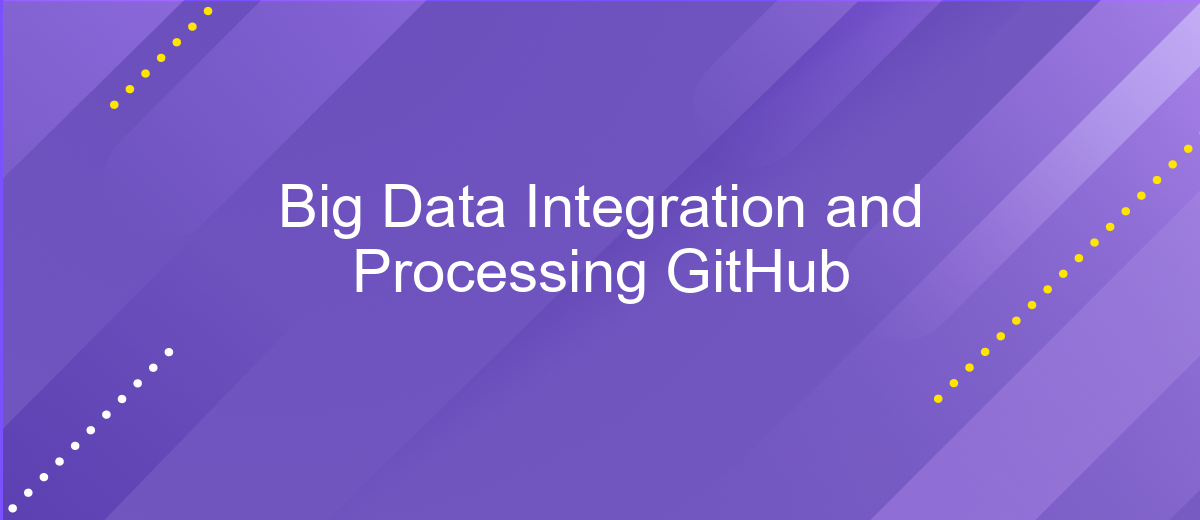Big Data Integration and Processing GitHub
Big Data Integration and Processing is a crucial aspect of modern data management, enabling organizations to handle vast volumes of heterogeneous data efficiently. This GitHub repository offers comprehensive tools, frameworks, and best practices to streamline the integration and processing of big data. Whether you're a data scientist, engineer, or developer, this resource aims to enhance your capability to manage and analyze large datasets effectively.
Big Data Integration and Processing GitHub
Big Data integration and processing are crucial for modern enterprises seeking to leverage their data assets. GitHub, as a collaborative platform, offers numerous repositories and tools that facilitate these processes. By using GitHub, developers and data scientists can access a plethora of open-source projects that streamline data integration and processing workflows.
- Apache Spark: A powerful engine for big data processing.
- Apache Kafka: A distributed streaming platform for real-time data integration.
- Airflow: A platform to programmatically author, schedule, and monitor workflows.
- Presto: A distributed SQL query engine for big data.
- NiFi: A data integration tool for automating data flows between systems.
Utilizing these tools available on GitHub can significantly reduce the time and effort required for big data projects. The collaborative nature of GitHub also allows for continuous improvement and innovation, as developers from around the world contribute to these projects. This makes GitHub an invaluable resource for anyone involved in big data integration and processing.
Overview

Big Data Integration and Processing on GitHub has become a crucial aspect for organizations looking to harness the power of extensive datasets. The platform offers a plethora of tools and repositories that facilitate the seamless integration and processing of big data. Developers and data scientists can find numerous open-source projects that cater to various needs, from data ingestion and storage to advanced analytics and visualization. GitHub serves as a collaborative environment where experts can contribute, share, and refine code, ensuring that the community benefits from the latest advancements and best practices in big data technologies.
One of the key challenges in big data integration is connecting disparate data sources efficiently. Services like ApiX-Drive can significantly streamline this process. ApiX-Drive offers a user-friendly interface for setting up integrations without requiring extensive coding knowledge. By automating data transfers between platforms, it ensures that data is consistently updated and readily available for processing. This not only saves time but also reduces the risk of errors, making it an invaluable tool for anyone involved in big data projects. Utilizing such services can greatly enhance the efficiency and effectiveness of big data workflows on GitHub.
Features

Big Data Integration and Processing on GitHub offers a comprehensive set of features designed to streamline data handling and analysis. This platform is tailored for developers and data scientists who require efficient tools to manage large datasets seamlessly.
- Scalability: Easily handle growing data volumes with scalable solutions.
- Data Transformation: Perform complex data transformations with minimal effort.
- Real-time Processing: Process data in real-time for instant insights.
- Integration: Seamlessly integrate with various data sources and third-party tools.
- Security: Ensure data integrity and confidentiality with robust security measures.
- Visualization: Utilize built-in visualization tools to interpret data effectively.
- Collaboration: Facilitate team collaboration with version control and shared repositories.
These features empower users to optimize their data workflows, enhancing productivity and enabling more informed decision-making. The GitHub platform ensures that all tools are accessible and easy to use, making it an indispensable resource for managing big data projects.
Benefits

Integrating and processing Big Data through GitHub offers numerous advantages for developers and organizations. One of the primary benefits is the ability to collaborate seamlessly across different teams and geographical locations. GitHub's platform allows multiple contributors to work on the same project simultaneously, ensuring that updates and changes are synchronized in real-time.
Another significant advantage is the robust version control system provided by GitHub. This feature enables teams to track changes, revert to previous versions, and manage code efficiently. It also helps in maintaining a clear and organized project history, which is crucial for debugging and auditing purposes.
- Enhanced collaboration and teamwork
- Efficient version control and history tracking
- Scalability to handle large datasets
- Integration with various tools and services
- Improved security and compliance
Additionally, GitHub supports integration with a wide range of tools and services, making it easier to automate workflows and streamline the development process. This integration capability not only boosts productivity but also ensures that the entire data pipeline is efficient and secure. As a result, organizations can leverage Big Data to gain valuable insights and drive informed decision-making.
- Automate the work of an online store or landing
- Empower through integration
- Don't spend money on programmers and integrators
- Save time by automating routine tasks
Challenges
Integrating and processing Big Data presents numerous challenges that organizations must navigate. One significant challenge is data heterogeneity, where data originates from various sources and exists in different formats. This requires sophisticated techniques and tools to harmonize and standardize the data for meaningful analysis. Additionally, ensuring data quality and consistency is paramount, as inaccurate or incomplete data can lead to flawed insights and decisions. Scalability is another critical issue, as the volume of data grows exponentially, demanding robust infrastructure and algorithms to handle large-scale data processing efficiently.
Another major challenge is maintaining data security and privacy, especially when dealing with sensitive information. Organizations must implement stringent security measures to protect data from breaches and unauthorized access. Integrating data from multiple sources can also be cumbersome without the right tools. Services like ApiX-Drive can streamline this process by automating data integration across various platforms, reducing manual effort and minimizing errors. Lastly, real-time data processing is essential for timely insights, but it requires advanced technologies and expertise to manage and analyze streaming data effectively.
FAQ
What is Big Data Integration?
What are the main challenges in Big Data Integration?
How can I automate the integration of Big Data from multiple sources?
What is the role of ETL in Big Data Processing?
Can I integrate Big Data with cloud services?
Strive to take your business to the next level, achieve your goals faster and more efficiently? Apix-Drive is your reliable assistant for these tasks. An online service and application connector will help you automate key business processes and get rid of the routine. You and your employees will free up time for important core tasks. Try Apix-Drive features for free to see the effectiveness of the online connector for yourself.


